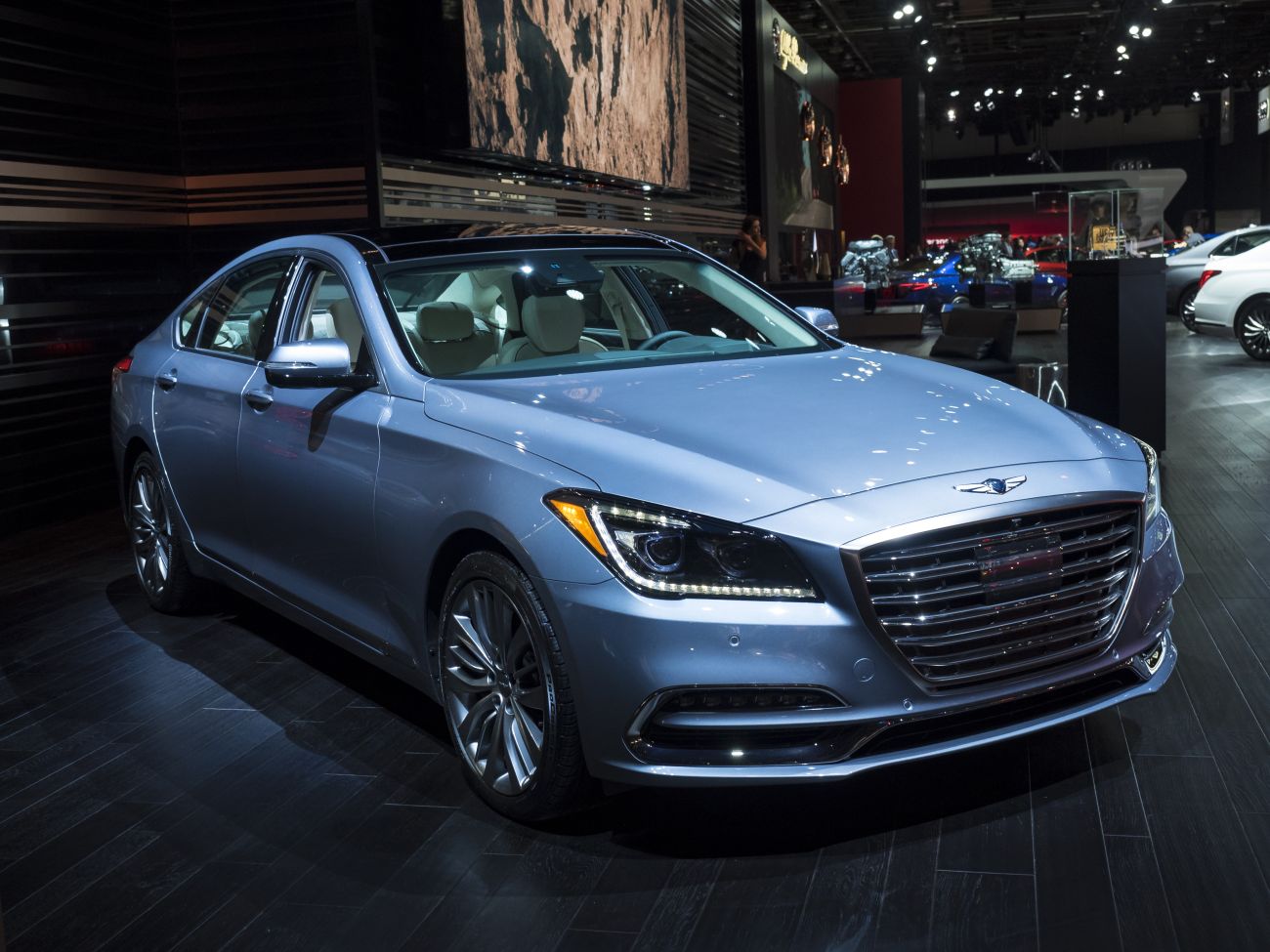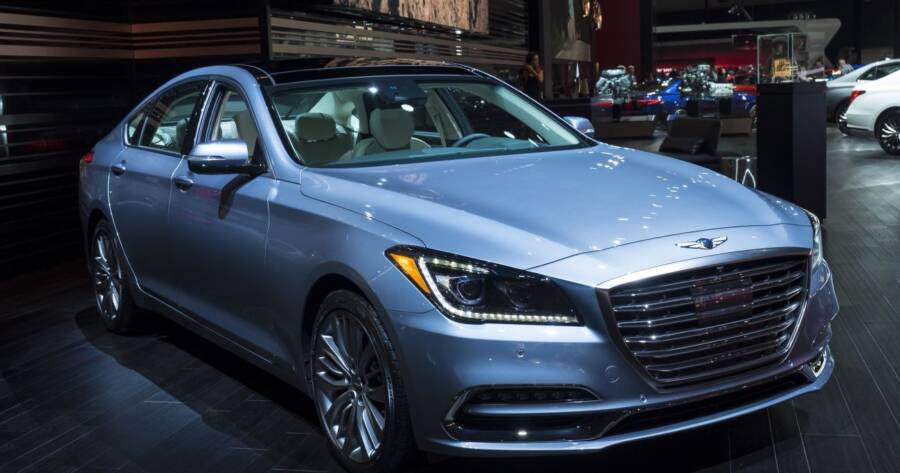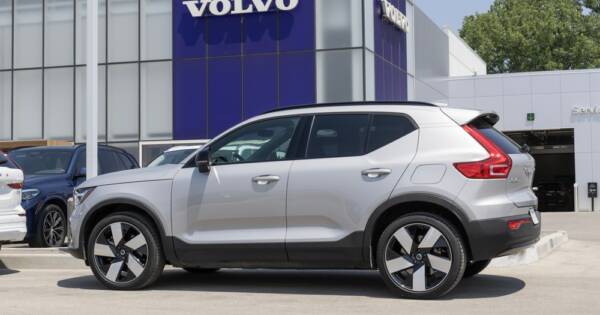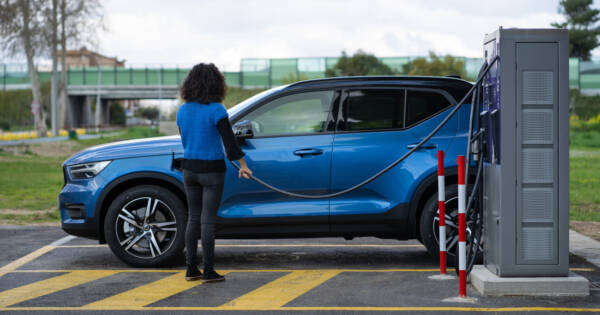The Hyundai Genesis and Equus were two of the best luxury vehicles on the market before they were discontinued after the 2016 model year. Since most people associated the Hyundai name with affordability, the luxury options did not get much attention from consumers. That will all change this year with the formation of the new Genesis brand. The 2017 Genesis G80 is the successor to the Hyundai Genesis, and it currently holds a manufacturer’s suggested retail price of $41,400. The 2017 Genesis G90 will replace the larger Hyundai Equus, and it has a manufacturer’s suggested retail price of $68,100.
These two new luxury sedans are striving to revolutionize their vehicle category by offering a mix of performance, luxury, style, and affordability not currently offered by the competition. The Genesis brand may not be a household name at the moment, but all of that could change very quickly after the release of the very impressive G80 and G90. Here is a breakdown of the most important feature categories for the new 2017 Genesis G80 and G90.
Performance Specs
You can expect to get amazing performance whether you choose the 2017 Genesis G80 or G90. While you will never be disappointment by the power provided when behind the wheel of either vehicle, the 2017 Genesis G90 is the slightly stronger vehicle.
The 2017 G80 features a 3.8 liter V-6 engine that will provide 311 horsepower. You can also expect to get 293 pounds of torque with the G80. The 2017 Genesis G90 features a 3.3 liter V-6 engine that will provide 365 horsepower and 376 pounds of torque. While they may be luxury sedans, the performance power offered by the 2017 Genesis G80 and G90 will rival most sports cars on the market right now.
Safety and Entertainment Specs
Luxury vehicles are known for offering a long list of safety and entertainment features, and that is exactly what you will get with the 2017 Genesis G80 and G90. You can expect to get voice-activated navigation, Bluetooth compatibility and high-definition satellite radio to entertain you on each drive. All these features can easily be accessed through the LCD touchscreen monitor installed in the dashboard.
The luxury sedans also offer some of the same safety features. Both vehicles have nine airbags, traction control, a blind spot monitoring system, a lane departure warning system, and a low tire-pressure warning light. These features will help keep you safe while driving on any road condition. Since the G90 is the more expensive option, it comes with a few more standard features than the G80. The 2017 Genesis G90 has 10 more performance speakers than the G80. Speed-adjusted audio and a parking assist camera are also standard in the G90 while you can only get them in the G80 for an extra fee.
How it Stacks Up Against the Competition
The 2017 Genesis G80 is classified as a luxury midsize sedan, so its primary competition will be from the Mercedes-Benz E-Class, Audi A6, BMW 5-Series, and Cadillac CTS. The Genesis G80 beats all the competitors when you combine the performance, interior construction, and safety scores from U.S. News & World Report. Beating these established luxury vehicles is even more impressive when you consider that the 2017 Genesis G80 also has a lower manufacturer’s suggested retail price than its four main competitors.
The 2017 Genesis G90 is classified as a large luxury sedan, so it main competitors will be the Audi A7, Cadillac CT6, BMW 6-Series, and Mercedes-Benz CLS. Just like the G80, the Genesis G90 is easily able to top its competitors when it comes to the safety, performance, and build quality. U.S. News & World Report currently ranks the 2017 Genesis G90 as the second-best large luxury sedan on the market right now. The only vehicle that topped it in the rankings was the 2017 Tesla Model S, which can cost up to $140,000. It is safe to say that you simply can’t find a better large luxury sedan at the same price as the affordable 2017 Genesis G90.
Fuel Efficiency
Fuel costs will be your primary vehicle expense after purchasing a new car, so fuel efficiency should never be ignored. While the 2017 Genesis G80 and G90 may be very similar in their appearance, they offer completely different fuel efficiency due to their distinct engines. The extra performance power that you get with the 2017 Genesis G90 comes at a cost of lower fuel efficiency than the G80.
The 2017 G90 gets approximately 17 miles per gallon in the city and 24 miles per gallon on the highway. The 2017 Genesis G80 features a fuel efficiency of approximately 18 miles per gallon in the city and 28 miles per gallon on the highway. When these numbers are combined, you will get to drive about two more miles for every gallon of gas with the Genesis G80.
Pros
Since the 2017 G80 and G90 are made by the same manufacturer, they have a lot of the same pros and cons. The biggest benefit of these luxury vehicles from Genesis is their affordable price. The G80 and G90 are proof that you do not have to destroy you budget to get a high-quality luxury car. The lengthy warranty is also a huge plus if you are purchasing a new vehicle from Genesis. Your new 2017 Genesis G80 or G90 will be covered under a basic bumper-to-bumper warranty for up to five years or 60,000 miles. They also come with a powertrain warranty lasting for 10 years or 120,000 miles.
The final main benefit of the new luxury vehicles from Genesis is their safety ratings. You never know what can happen on the road, so it is always good to protect the family by driving a safe car. The 2017 Genesis G80 and G90 both got perfect safety scores from U.S News & World Report.
Cons
The biggest con with the new G80 and G90 is the poor fuel economy. Nearly every competing luxury sedan will be able to top the 2017 Genesis G80 and G90 when it comes to gas mileage. If you do not plan to use or show off the powerful engine in the G80 or G90, then you will likely be disappointed in the poor fuel efficiency. A new car in 2017 simply should be able to get more than 20 miles per gallon.
While this will not bother everyone, the 2017 Genesis G80 and G90 also have much smaller trunks than most luxury sedans. This is not a huge problem, but it should still be mentioned. If you like to regularly load up the trunk with a lot of items, then you will likely be disappointed with the size of the trunk offered by these two cars. The spacious backseat should be able to help offset this problem if the car is not filled with passengers.
 Ed Aldridge / Shutterstock.com
Ed Aldridge / Shutterstock.com


